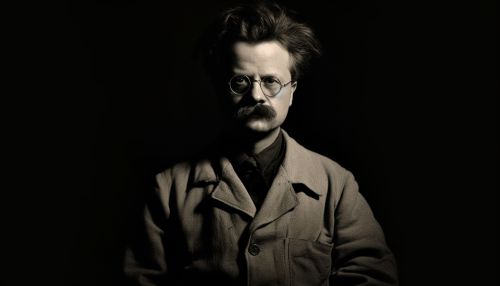Leon Trotsky
Early Life
Leon Trotsky, born Lev Davidovich Bronstein on November 7, 1879, in Yanovka, Russian Empire, was the fifth child of a wealthy but illiterate Jewish farmer, David Leontyevich Bronstein, and his wife Anna Bronstein. Trotsky's upbringing in the rural Ukraine, far from the centers of Russian intellectual life, shaped his characteristic independence of mind and his later identification with the peasantry.
Education
In 1888, Trotsky moved to the port city of Odessa for his secondary education. He attended a German-language school, where he was introduced to the works of Karl Marx. Trotsky's exposure to Marxist ideas, combined with his experience of growing up in a predominantly Jewish environment, would significantly influence his political ideology.
Political Awakening
Trotsky's political awakening came in 1896 when he moved to Nikolayev to work as a draftsman. There, he joined a Marxist discussion group and began to read more widely, absorbing the works of Friedrich Engels, Georgi Plekhanov, and other leading Marxists. In 1897, Trotsky helped found the South Russian Workers' Union, an early attempt to organize workers in the region.
Arrest and Exile
In 1898, Trotsky was arrested for his revolutionary activities and exiled to Siberia. During his exile, he married Alexandra Sokolovskaya, a fellow Marxist, and had two daughters. Despite the harsh conditions, Trotsky continued his political work, writing and distributing revolutionary pamphlets.
Return to Politics
After escaping from Siberia in 1902, Trotsky moved to London, where he joined the Russian Social Democratic Labour Party (RSDLP) and met Vladimir Lenin. Trotsky quickly rose to prominence within the party, impressing Lenin with his intellectual rigor and his commitment to the cause of revolution.
Role in the 1905 Revolution
In 1905, Trotsky returned to Russia to participate in the first Russian Revolution. He played a leading role in the St. Petersburg Soviet, a council of workers' deputies, and developed the theory of "permanent revolution", which argued that in countries like Russia, the bourgeoisie could not carry out its own revolution and that this task would fall to the proletariat.
Split with Lenin
In 1907, Trotsky broke with Lenin and the Bolsheviks over questions of party organization and strategy. Trotsky argued for a more democratic and inclusive party, while Lenin favored a more centralized and disciplined approach. This split would define Trotsky's political career and his relationship with Lenin for the next decade.
Role in the 1917 Revolution
In 1917, Trotsky returned to Russia following the February Revolution and joined the Bolsheviks. He played a crucial role in the October Revolution, leading the Military Revolutionary Committee that seized power in Petrograd. Following the revolution, Trotsky was appointed People's Commissar for Foreign Affairs and later Commissar of War, where he played a key role in the Red Army's victory in the Russian Civil War.
Opposition to Stalin
Following Lenin's death in 1924, Trotsky emerged as the leading opponent of Joseph Stalin. Trotsky criticized Stalin's bureaucratic tendencies and his policy of "socialism in one country", arguing instead for international revolution. However, Trotsky was outmaneuvered by Stalin and expelled from the Communist Party in 1927.
Exile and Assassination
In 1929, Trotsky was exiled from the Soviet Union. He lived in Turkey, France, and Norway before settling in Mexico in 1937. Despite his exile, Trotsky continued to write and organize, founding the Fourth International in 1938. In 1940, Trotsky was assassinated by a Soviet agent, Ramón Mercader, in his home in Mexico City.
Legacy
Trotsky's legacy is controversial. He is revered by some as a champion of workers' rights and a critic of Stalinist totalitarianism, while others criticize him for his role in the Red Terror and the suppression of opposition during the Civil War. Despite these controversies, Trotsky remains a significant figure in the history of revolutionary socialism.


